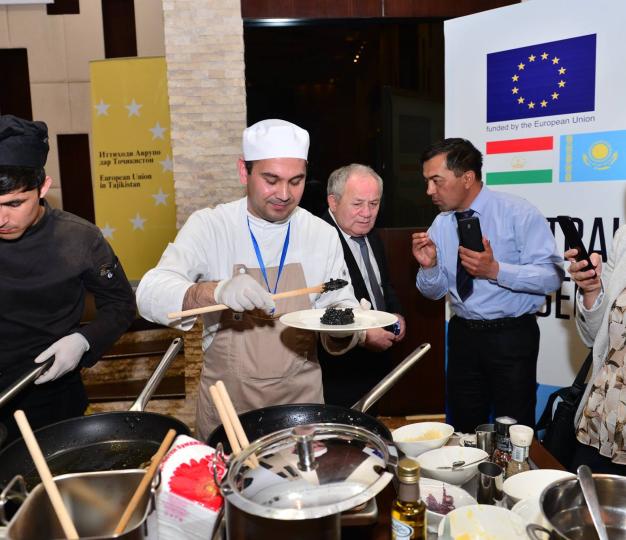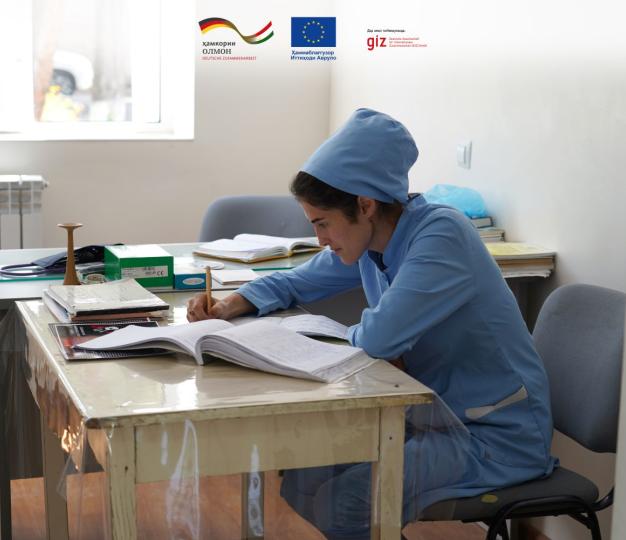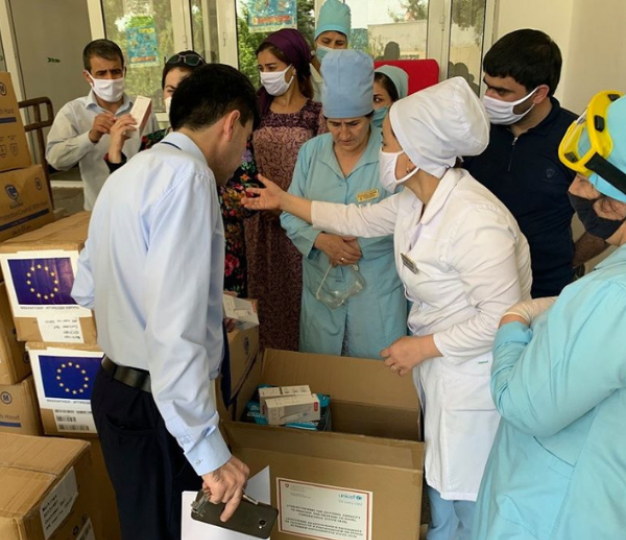RELATIONS WITH THE EU
The European Union and Tajikistan
The European Union (EU) and Tajikistan are working together at a political and economic level, guided by the Partnership and Cooperation Agreement as well as the European Union and Central Asia Strategy. The EU Delegation to Tajikistan is engaging with civil society and working for improvement of human rights standards in Tajikistan.
Political Relations
Political relations between the EU and Tajikistan are guided by the bilateral Partnership and Cooperation Agreement in force since 2010, and the new EU Strategy on Central Asia “New Opportunities for a Stronger Partnership”, adopted in 2019. With a vision to bring their relations to a new level, at the beginning of 2023 the EU and Tajikistan have started negotiations on an Enhanced Partnership and Cooperation Agreement (EPCA).
The EU Special Representative for Central Asia, Ambassador Terhi Hakala, regularly visits Tajikistan. During her visits, she meets with a wide range of interlocutors to discuss Tajikistan’s role in the regional context, developments in the areas on the EU – Tajikistan and EU- Central Asia agenda as well as Tajikistan’s reform agenda.
Strategic Documents
The Partnership and Cooperation Agreement came into force on 1 January 2010 after ratification by all EU countries. It contributes to enhance bilateral relations and heighten the EU profile in Tajikistan, setting out the parameters for increased political dialogue, bilateral cooperation and the promotion of bilateral trade and investments.
The new EU Strategy on Central Asia aims to forge a stronger, modern and non-exclusive partnership between the European Union and the countries of Central Asia. The main objective is to develop as a sustainable, prosperous, and closely interconnected economic and political regional space.
The Cooperation Council between the European Union is an annual platform to hold high- level exchange to discuss the state of play of bilateral relations, address political and socio-economic developments, trade, investment and energy cooperation, as well as regional and international issues. The Cooperation Council held its tenth meeting on 26 June 2023 in Luxembourg.
Closer to the Tajik people
In order to bring the EU closer to the Tajik people, the EU organises European Week each year. This is an opportunity to introduce European cultures to Tajikistan and to outline the work of the EU Delegation. Furthermore, many Tajik students have already been successful in applying for the Erasmus Plus programme, which allows them to study in the EU.
Trade and economic relations
Trade and economic relations between the EU and Tajikistan are governed by the Partnership and Co-operation Agreement (PCA) signed in October 2004 and which came into force on 1 January 2010. The agreement provides for a non-preferential agreement under which the parties grant each other 'most-favoured nation' (MFN) treatment with respect to tariffs whilst quantitative restrictions are prohibited in bilateral trade.
The agreement also envisages progressive regulatory approximation of the national legislation and practices to the most important EU trade-related standards, including technical regulations, sanitary and phytosanitary requirements, protection of intellectual property rights, and customs issues. This should lead to better practical access to the EU markets for goods originating in Tajikistan.
EU Systems of Preferences
Tajikistan is also a beneficiary of the EU's Generalised System of Preferences (GSP), a bilateral trade arrangement through which the EU provides preferential access to its market to developing countries and territories, in the form of reduced tariffs for their goods when entering the EU market. Preferential imports from Tajikistan are heavily concentrated in two sectors, industrial products such as base metals and textiles.
Tajikistan is the smallest trade partner of the EU in Central Asia. In 2019, the EU exported €169 m to Tajikistan and imported € 44 m (mainly aluminium and textiles), with no significant evolution compared to 2018 and 2017. Tajikistan joined the WTO in 2013 but has so far not substantially benefited from it in terms of trade flows. Tajikistan has recently become committed to join the Special Incentive Arrangement for Sustainable Development and Good Governance (GSP+). GSP+ can act as a positive political and economic signal to the international community and business that the government is binding itself to international law and continuous, transparent monitoring.
Loans and Investments
The EU has developed several loans and investment programmes from which Tajikistan has benefited in the past. Tajikistan received its first European Investment Bank (EIB) loan in 2011, and in the same year, the EU and Tajikistan signed the Financing Agreement for a Human Development Support Programme regarding health, social protection and public finance management.
High-level Discussion
Economic relations have often been on the agenda of the Cooperation Council of the EU and Tajikistan, which holds annual high-level discussions, at FMs level. These have underlined the importance of economic reforms in Tajikistan and the significant increase in bilateral trade that the EU and Tajikistan have witnessed. The Cooperation Council between the European Union (EU) and Tajikistan held its ninth meeting on 19 February 2021 via video conference between Brussel, Lisbon and Dushanbe.
Human rights dialogues
Human rights dialogues
The EU-Tajikistan Human Rights Dialogues offer a platform for discussion of questions of mutual interest and serve to enhance cooperation on human rights in multilateral fora such as the Organisation for Security and Cooperation in Europe (OSCE) and the United Nations. Officials from the EU meet their counterparts from Tajikistan's government on a yearly basis to address human rights issues. The first Dialogue took place in Dushanbe on 31 October 2008.
The European Union and Tajikistan held the thirteenth annual Human Rights Dialogue on 7 December 2022. The dialogue allowed for a frank and constructive exchange on a wide range of human rights issues, including women’s rights, gender-based violence and non-discrimination. Particular attention was dedicated to the freedom of expression and access to information offline and online.
The EU supports Tajikistan in ensuring full alignment with international standards in the field of human rights. A regular dialogue on the rule of law and human rights is an essential part of our bilateral relations. Progress in respect for human rights and fundamental freedoms is of particular importance in view of the negotiations of the Enhanced Partnership and Cooperation Agreement between the European Union and Tajikistan.
Thematic Programme on Human Rights and Democracy
The Programme on human rights and democracy is a major flagship tool of the EU to promote and protect human rights and fundamental freedoms, democracy and rule of law around the world. In Tajikistan, the EU focuses particularly on promoting freedom of media, strengthening the role of civil society, promoting gender equality, supporting the penitentiary system reform. Tajikistan receives around €800.000 every year under this programme.
Civil society dialogue
Civil society in Tajikistan is actively engaged in the preparation of the annual EU –Tajikistan Human Rights Dialogue, which is the main political arena for discussing human rights issues with the Tajik authorities.
The Thematic Programme for Civil Society Organisations is an EU instrument that aims at strengthening CSOs as independent actors of good governance and development in their own right. The projects under this programme mainly focus on inclusive CSO participation in dialogue and to strengthen CSO partner capacities. Tajikistan receives around €950,000 per year under the CSO thematic programme.
Civil Society Seminars
As part of its engagement with civil society, the EU Delegation discusses important human rights topics with representatives of civil society in Tajikistan. Once a year, the EU organises a Civil Society seminar, discussing a different topic each time.
The last Civil Society Seminar focused on “Economic and Social Empowerment of Women and Girls in Tajikistan”. The European Union stands ready to provide its full political and financial support to the Government of Tajikistan to work at decreasing gender inequality and promoting empowerment and engagement of Tajik women in all areas of social and economic life.
Civil Society Organisations
In April 2023, the EU Delegation to Tajikistan published a new call for proposals to support civil society organisations.
Applicants applied for EU funding for projects in the three prioritised areas:
- supporting freedom of media, access to information and fight against disinformation, also with respect to new technologies and digital rights;
- contributing to eradication of torture and supporting penitentiary system reform;
- supporting actions to fight discrimination, including promoting gender equality and women's rights – under the human rights and democracy programme.
For the CSO programme, the following areas were prioritised under the call for proposals:
- strengthening CSOs and an enabling environment for their operation, with specific emphasis on youth and youth CSOs;
- supporting CSOs to benefit from digital transformation and in their work on strengthening citizens’ digital skills, in order to create employment opportunities especially for the youth; and
- supporting CSOs’ actions with marginalised groups, particularly people with disabilities.
The European Union in this call for proposals allocated a total of €3 070 000. Applicants could request a grant between €200,000 and €600,000.
Development and technical cooperation
The EU - Tajikistan cooperation on development matters stretches back to 1991. The EU’s cooperation activities have up until today covered a wide range of areas, including rule of law, good governance, human rights, health, education, water, energy, and rural development.
The EU’s cooperation activities aim to support a sustainable human and socio-economic development of the country and boost regional cooperation between the Central Asian countries, hence contributing to regional stability and enhanced intra-regional connectivity. The EU puts a strong emphasis on supporting reforms in sectors of key importance for national development, such as energy and water, working closely with the Government of Tajikistan and our partners, including IFIs, such as the World Bank, ADB and the EBRD.
The EU defines its medium and long-term international cooperation priorities at the bilateral, regional and thematic level through Multiannual Indicative Programmes (MIPs), which cover a period of seven years. The MIPs are designed together with the partner country government to ensure alignment with relevant national development strategies. The MIP is also coordinated with development partners to ensure complementarity.
EU - Tajikistan bilateral cooperation
Under the previous bilateral MIP for Tajikistan for the period 2014-2020, the EU allocated EUR 251m, mainly to support the rural development, education and health sectors in the country. The EU’s focus on rural development and health has been particularly strong during this period.
On rural development, the EU is providing significant support in areas such as agricultural production, value-chain development, natural resource management, and the efficient and sustainable use of water.
On health – under the Health Development Programme (HDP) – the EU is providing a wide range of support, including to strengthen the primary health care system; providing water, sanitation and hygiene (WASH) and waste management infrastructures in health care facilities; and improving coordination between the actors in the sector.
Building on previous efforts, the EU has allocated EUR 91m for its cooperation with Tajikistan for the 2021-2024 period, focusing on three priority areas:
- Inclusive green and digital economy
- Human development
- Natural resources management, efficiency, and resilience
Under the EUR 91m envelope, the EU has approved a number of key actions, such as:
- A EUR 30m budget support programme to support Technical and Vocational Education and Training (TVET) and Public Financial Management (PFM)
- The EUR 15m Sustainable Energy Support Programme, which will amongst other things provide a large 10m technical assistance package to support the ongoing energy sector reform.
- The EUR 14m Rural Drinking Water Supply and Sanitation Project with the World Bank to support the country’s water sector reform efforts, including by improving institutional capacity and providing infrastructure to improve drinking water supply in rural areas.
In addition, the EU is preparing a project to support the cotton sector in the country, in particular to promote sustainable cotton value-chains.
Additional funds will be allocated for the remaining MIP period of 2025-2027.
Regional and thematic cooperation
At the regional level, the EU cooperates with Tajikistan within the framework of the EU’s Strategy for Central Asia, adopted in 2019. Tajikistan is benefiting from more than 40 regional programmes (approximately EUR 450m) in the fields of economic development, border management, trade, energy, nuclear safety, disaster risk reduction, environment, climate change, and water resilience.
Tajikistan is a beneficiary of two newly launched Team Europe Initiatives (TEIs) under the new regional MIP. The TEIs focus on (i) water, energy & climate and (ii) digital connectivity respectively – two areas of critical importance for Central Asia and where the EU and its member states can provide substantial added value thanks to their vast experience of cooperation in the regional water sector and high technical standards on key sectors for connectivity such as energy and digitalisation.
Tajikistan also benefits from thematic support through the European Instrument for Democracy and Human Rights, global initiatives like the Spotlight Initiative, Global Partnership for Education, and the Instrument for Nuclear Safety Cooperation, and others.
Humanitarian Aid
Tajikistan is prone to various and frequent natural disasters such as floods, landslides, cold waves and earthquakes. In recent years, the rising temperatures due to climate change are exacerbating the impact of climate-related disasters. Floods occur regularly, which can be quite disastrous to some communities at the local level.
In response to a series of floods and mudflows that wreaked havoc across large parts of Tajikistan in early May 2021, the European Union provided EUR 100,000 in humanitarian aid funding to assist the most vulnerable communities.
EU Assistance for response to COVID-19
The EU stands by the Tajik People with a contribution of € 48 million in the Team Europe Package adopted on 11 April, which EU provided as part of a comprehensive €112.2 million development cooperation support package, to assist Tajikistan respond to the threat of coronavirus and address longer-term health and socio-economic needs to enhance livelihoods.
The package consists of three interlinked programs: the Health Development Program (€52.2 million), the Quality Education Support Program II (€50 million), and Support to Civil Registry System Reform (€10 million). The first two programs contain elements (worth €46.2 million in total) that will directly support the emergency response to the pandemic, as well as boost efforts to mitigate its negative socio-economic impacts.
EIB made a 20 million € loan available for crisis response (pending consultation and approval). The EIB emergency response is a combination of rapid utilisation of signed credit lines and preparation of new loans, to support Tajikistan’s health sector modernisation and SMEs.







